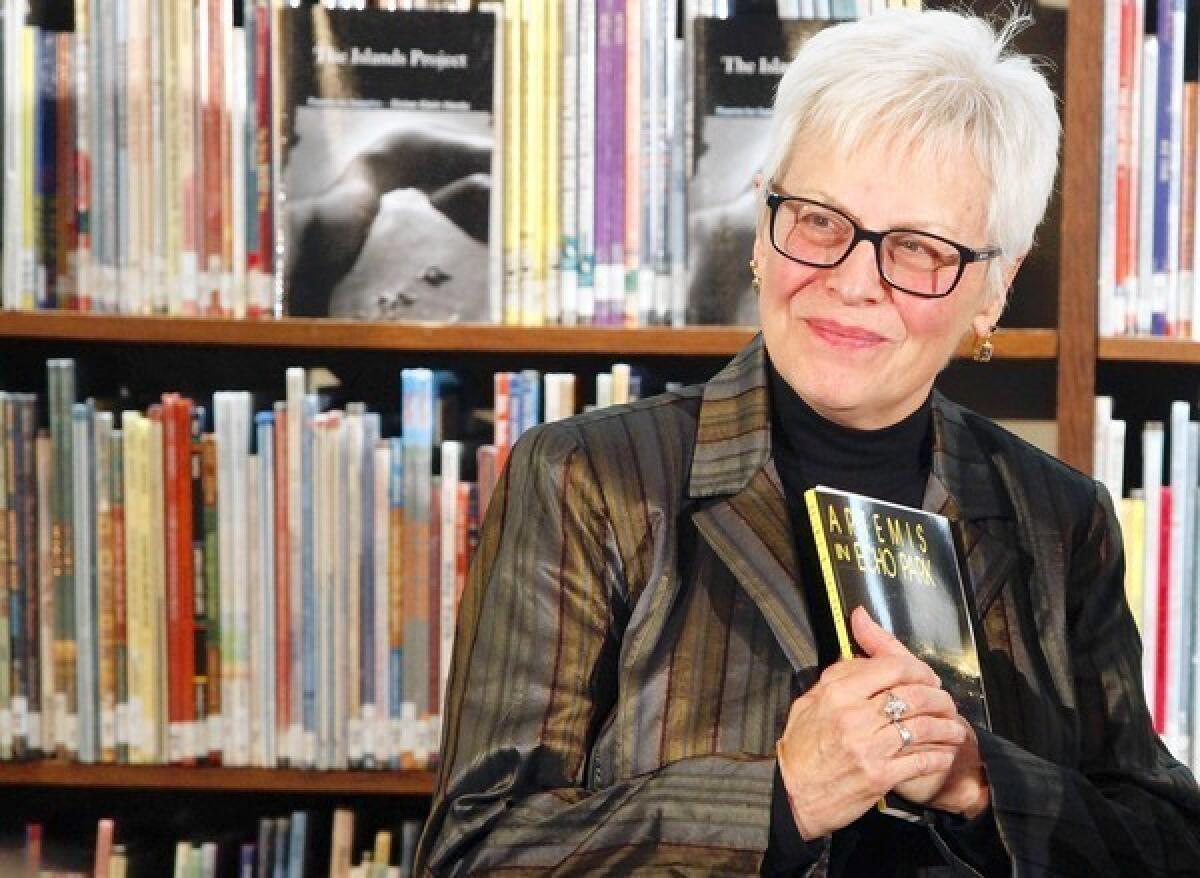Eloise Klein Healy paints Los Angeles in poems

- Share via
Just a few months ago, Eloise Klein Healy was chosen as L.A.’s first poet laureate. Now a new anthology of Healy’s work offers ample proof, if any were needed, what an inspired choice she was.
“A Wild Surmise” is a vivid record of one woman’s artistic and emotional quest, a journey that unfolds, for the most part, in the streets, gardens and homes of Los Angeles.
The City of Angels appears again and again in the work of Healy, a native of El Paso who grew up in Iowa but who has made Los Angeles her home since the 1970s. “A Wild Surmise” collects writing from six books she’s written while living here, along with a few new poems.
The question of what Los Angeles is, and how Healy sees it, comes early in “A Wild Surmise.”
“Like an older sister who wasn’t quite as pretty / you were never expected to become much,” begins a poem titled “Los Angeles.” L.A. isn’t just the less-pretty sister in this early poem of Healy’s — it’s also the bigger sister: “There was something about your proportions / that was indelicate — your more abundant waist.”
Most poets, Healy writes in “Los Angeles,” are drawn to the thinner, younger sister. But L.A. is a big woman who secretly finds a lover drawn to her bigness, a paramour whose amorous attentions are “completely out of proportion.”
“A Wild Surmise” shows Healy to be a disciplined, polished poet with a vision that’s unfailingly open and generous. As Healy cares for the people close to her, or mourns them, her emotions take residence in the city’s natural and built environments, landscapes that feel at once exotic and familiar, cruel and welcoming.
“No matter what else is happening, / this is California. You’ll have your cancer / at freeway speeds,” she writes in “The Beach at Sunset,” a poem about guiding her life partner through breast cancer treatments.
“Suite for a Young Man Dying” is a deeply moving goodbye to the late poet Gil Cuardros and a celebration of the vitality of 1990s Silver Lake, then and now a center of L.A.’s gay culture:
Santa Ana winds cleaned the lanes
between the stars
and the night sky below the planetarium,
all the way down to Hollywood Boulevard, winked
like a strobe-ball
in a boy-dance bar room.
Look up Healy in a poetry guide and often she’ll be associated with lesbian writers: She founded Arktoi Books, an imprint dedicated to publishing lesbian authors, and wrote one collection dedicated to Sappho, the Greek lyric poet who spoke of her love for women. There are many woman-centered poems in this collection as well.
“I sat down and began / to make a history / of my sexual self,” she writes in “The Day After Meeting Her.” “And there was always a woman there.”
Her other great muse is Walt Whitman — in a poem called “My Mothers” she refers to him as “Mother Whitman.” Like Whitman, Healy feels the need to embrace the multitudes around her.
The poem “I Live in the City of Los Angeles” finds her on Westerly Terrace in Silver Lake watching women “balancing on their heads / plastic baskets full of sheets.” She’s seen an image from rural Latin America transplanted to Los Angeles. Healy grew up around farmland herself, and in that scene she sees an experience she shares with people who grew up on farms where Spanish was spoken. “We are all from the country still / and we are each old / in our own way,” she writes.
In that poem and others, Healy communicates one of the great unspoken truths about L.A. — it’s a city whose residents are often just a generation, or a few years, removed from roots as farmers, sharecroppers and campesinos.
One measure of how deeply immersed Healy is in the life of her adopted hometown is the frequency with which she allows L.A.’s second most popular language, Spanish, to seep onto her tongue. In “Escucha, Mi Vida,” Healy incorporates a Spanish term of endearment into a love poem directed to a non-Spanish speaker and plays with the pun of phrase’s literal meaning. (It translates, literally, as “Listen, My Life” but is actually closer to “Listen, My Love.”)
In “A Wild Surmise” we find a poet whose curiosity about her surroundings is constantly renewing itself. She’s come to know L.A. well enough that she can joyfully shatter the myth that it’s a young city with no history.
The frontier outpost that Los Angeles was is the subject of “The City Beneath the City,” in which the ghosts of 19th century California come bubbling to the surface. “In the zanjas, horses drank / and scum floated on the water / green as neon.”
One expects that poem, and many others in “A Wild Surmise,” will be heard in classrooms and auditoriums around Los Angeles as Healy begins her underpaid work as the city’s poet laureate. But this collection shows that long before she was granted that honor, Healy embraced the poet’s public role.
A Wild Surmise
New & Selected Poems & Recordings
Eloise Klein Healy
Red Hen Press: 242 pp., $19.95 paper
More to Read
Sign up for our Book Club newsletter
Get the latest news, events and more from the Los Angeles Times Book Club, and help us get L.A. reading and talking.
You may occasionally receive promotional content from the Los Angeles Times.








